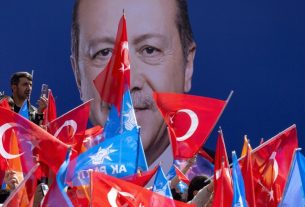Blessing Okagbare was a track and field athlete who until recently felt truly blessed. “Hola amigo,” she wrote to her amigo, one Eric, in June 2021. “Eric, my body feels so good. I just ran 10.63 seconds over the 100m,” the second fastest time at the time in history. “I’m so happy,” Okagbare was happily pounding into his phone, “Ericcccccccc! Whatever you’ve done, it’s working so well!”
What good Eric had done can be summarized as follows: He had put together a tasty menu of growth hormones and other delicacies from the doping kitchen. The Okagbare catapulted themselves into the circle of Olympic favorites shortly before the Tokyo summer games.
That all this after reached the publicit is thanks to a new investigative body that has what it takes THE To become an authority in the fight against doping and fraud: the “Rodchenkov Act”, an American anti-doping law named after the key witness who in 2015 initiated the Russian state doping scandal and fled to the United States. Now a federal court in Manhattan is closing the first case under the new law. Eric Lira, Okagbare’s full name “amigo” — a 43-year-old Texan who calls himself a naturopathic and kinesiologist — has now admitted to supplying Okagbare and other “Olympic athletes” with banned substances. “A game-changer for international sport,” said lead prosecutor Damian Williams, and perhaps it wasn’t even highlighted too much.
The “Rodchenkov Act” is based on the anti-mafia laws of the United States and, instead of the athletes, it shines the spotlight on the people behind it: doctors, supervisors, officials. In this way, state investigators, independent of organized sport’s interests, can unravel the fraud from the perspective of the end user, the convicted athlete. An effective procedure, especially since the US judiciary can intervene wherever even a single US dollar is moved. So almost everywhere, especially in big muscle parades like the Olympics. Of course, organized sport does not like the fact that the United States can now also take action against those behind the scenes abroad – it only brings chaos to the fight against fraud, the World Anti-Doping Agency has always complained. Or does it not rather shed light on a system that still prefers to control itself?
In Germany, the prosecutor often investigates doping cases afterwards
Indeed, it is not without its problems when the judiciary of one of the world’s most powerful sporting nations becomes a cross-border anti-doping authority. It behaves as in the case of American citizen Eric Lira, but shows how sharp tools can work in the service of a good cause. A witness found doping in an athlete’s bag and notified the FBI. This is the only way detectives have come across Okagbare and his drug dealer: Eric Lira. Anti-doping investigators targeted the Nigerian, who tested positive shortly before the Tokyo Games. When she returned to the United States, where Okagbare was then living, state investigators confiscated her cell phone, along with text and voicemail messages. So they tied up a thick carpet of evidence that allowed investigators from the World Athletics Federation to block Okagbare for eleven (!) years – and that too further procedures against more athletes influenced.
All of this seems more stringent than the way sports investigators and government agencies have joined forces in Germany to date. There the prosecutor often intervenes when a doping test has already revealed obvious signs, in the sense that the athletes have been warned. (Operation Bloodletting was a notable exception). Also in the case of first division basketball player Jason George from Chemnitz, a positive result the state is now investigating the aftermath. But that may not be so wrong for some representatives of organized sport.




